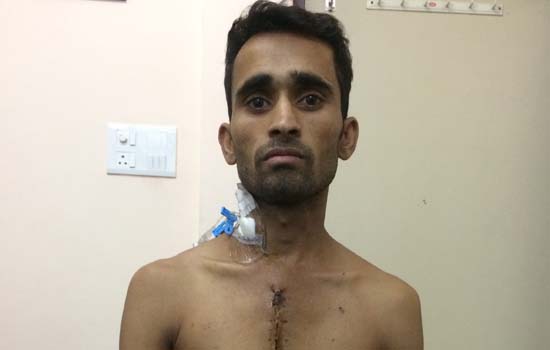
Udaipur, Aortic Valve Replacement through Minimally Invasive Cardiac Surgery was successfully performed in a patient of 27 years of age by Geetanjali Medical College & Hospital’s Cardiac Thoracic & Vascular Surgeon Dr. Sanjay Gandhi. The operating surgeon’s team also includes Cardiac Thoracic & Vascular Surgeon Dr. Surendra Patel, Cardiac Anesthetists Dr. Ankur Gandhi, Dr. Manmohan Jindal, Dr. Kaplesh Mistry & Dr. Tasha Purohit.
Chittorgarh resident, Dinesh Suthar, age 27 years, from past many years was suffering from breathlessness, tender weakness, and pain in the body, fast heartbeat and was unable to carry off his daily routine work. In consultation with Cardiologist Dr. Ramesh Patel at Geetanjali Hospital & investigations of Echo-Cardiography, it was confirmed that the main artery of the heart, called as the aorta, was leaking from sides. Due to which the patient was referred to Cardio Thoracic & Vascular Surgeon Dr. Sanjay Gandhi.
The patient then had undergone thoracic Minimally Invasive Cardiac Surgery, also known as MICS CABG (Minimally Invasive Cardiac Surgery/Coronary Artery Bypass Grafting) a heart surgery performed through several small incisions instead of the traditional open-heart surgery. A long, thin tube (thoracoscope) containing a tiny high-definition video camera was inserted through a small incision in the chest. The incision so made was not more than 7 centimeters long against the incision of 15 to 18 centimeters for an open heart surgery. This surgery was performed with the help of Tracheo Esophageal Echo-Cardiography; the new & advanced technology used in MICS and the aortic valve was replaced. The patient was treated free of cost under the flagship scheme of Rajasthan Government’s Bhamashah Bima Swasthya Yojana (BSBY).
Minimally Invasive Cardiac Surgery has several advantages over the traditional techniques as; reducing pain, retaining function, normal routine activities are not disrupted and can be started almost immediately, negligible blood loss, wound infections or post-surgical lung infections are reduced, cosmetic incision, very short hospitalization and faster recovery etc. as told by cardiac surgeon, Dr. Gandhi. Minimally invasive surgery involves risks similar to open-heart surgery, but the most common is to monitor heart through a very small incision and perform the surgery.
For any queries kindly contact Dr. Sanjay Gandhi: +91 97845 86176
Source :
 Udaipur, Aortic Valve Replacement through Minimally Invasive Cardiac Surgery was successfully performed in a patient of 27 years of age by Geetanjali Medical College & Hospital’s Cardiac Thoracic & Vascular Surgeon Dr. Sanjay Gandhi. The operating surgeon’s team also includes Cardiac Thoracic & Vascular Surgeon Dr. Surendra Patel, Cardiac Anesthetists Dr. Ankur Gandhi, Dr. Manmohan Jindal, Dr. Kaplesh Mistry & Dr. Tasha Purohit.
Udaipur, Aortic Valve Replacement through Minimally Invasive Cardiac Surgery was successfully performed in a patient of 27 years of age by Geetanjali Medical College & Hospital’s Cardiac Thoracic & Vascular Surgeon Dr. Sanjay Gandhi. The operating surgeon’s team also includes Cardiac Thoracic & Vascular Surgeon Dr. Surendra Patel, Cardiac Anesthetists Dr. Ankur Gandhi, Dr. Manmohan Jindal, Dr. Kaplesh Mistry & Dr. Tasha Purohit.